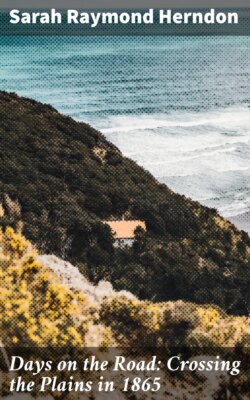Читать книгу Days on the Road: Crossing the Plains in 1865 - Sarah Raymond Herndon - Страница 11
На сайте Литреса книга снята с продажи.
AN ADDITION TO OUR PARTY.
ОглавлениеTable of Contents
“Yes, but they won’t; do you suppose they are going to let us see them cooking and washing dishes? Not if they know themselves. Then they would have to play the agreeable once in a while, and that is what they are not going to do on a trip of this kind. I do not expect to see them, they would rather stay where they are another week than join our party.”
“I believe you are right, Neelie, for he did not say good-bye as if he expected to see me very soon.”
When it was time to stop for lunch, we found a very nice place and waited for the wagons. While at lunch we saw an emigrant wagon, drawn by three yoke of oxen, coming up the road, and were somewhat surprised to see it turn from the road and come toward our camp. It proved to be Mr. John Milburn, of Etna, and his sister Augusta. They have traveled in one day and a half the distance we have been two and a half days coming.
Miss Milburn is a very intelligent, well-educated young lady, some two or three years my senior. We are not very well acquainted with her, but have met her frequently, and have known of her several years. She is an active member of the Presbyterian Church at Etna. She has her little nephew, Ernest Talbot, with her. He is seven years old, her sister’s dying gift, a very bright child and considerably spoiled, but dear to his auntie’s heart as her own life. They have started to Montana to get rich in the gold mines. Mr. Milburn leaves a wife and two small children with his widowed mother, to watch, and wait, and pray for his success and safe return home.
We crossed the dividing line—though we did not see it—between Missouri and Iowa soon after noon, and it is very probable some of us will never tread Missouri soil again. As we were coming through Stilesville, a small town this side the line, there were several loafers in front of a saloon who acted very rudely, to say the least.
We distinctly heard such remarks as the following, “Whew, what pretty girls, and how well they ride—Missourians I’ll bet.”
“Say, boys, let’s try our luck; maybe we can each hook a pony to-night?”
Mr. Milburn’s team is so tired out with such fast driving that we have stopped earlier than usual, and I have had more time to write. We are only two or three miles from Stilesville. The weather is perfect; we will sleep in the wagons to-night. Mr. Kerfoot thinks it necessary to guard the camp. I believe it an unnecessary precaution, for if those loafers at Stilesville had meant mischief they would not have expressed themselves so freely. However, Ezra and Frank Kerfoot (Mr. Kerfoot’s nephews), Sim Buford, and Brother Hillhouse, will take turns standing guard, each one for two hours.
* * * * *
Thursday, May 4.
Oh, how we did sleep last night, dreamless and sound. Our first night in the wagons was undisturbed and sweet. We were up with the birds making ready for an early start. Mother prepares breakfast, while I roll up the beds and cover closely to protect them from the dust; one of the boys milks the cows, while I assist mother, and when breakfast of hot biscuit, ham and eggs, apple-sauce, coffee, and breakfast-food (which I should have mentioned first), is over, I strain the milk into an old-fashioned churn that is big at the bottom and little at the top, cover closely and fix it in the front of the freight wagon, where it will be churned by the motion of the wagon, and we have a pat of the sweetest, most delicious butter when we stop in the evening that any one ever tasted. Mother washes the dishes, we prepare lunch for our noon meal, I stow it in the grub-box under the seat in the spring-wagon, the boys take the pipe off the little sheet-iron stove, empty the fire out and leave it to cool, while I am putting things away in the places where they belong. It is wonderful how soon we have learned to live in a wagon, and we seem to have an abundance of room.
When horses are harnessed, oxen yoked—and everything ready to start, we girls proceed to saddle our ponies; some of the boys usually come and offer assistance, which is politely declined, as we are going to wait upon ourselves on this trip.
The wagons start, leaving us to follow at our leisure. We don our riding-habits, made of dark-brown denim, that completely cover, and protect us from mud and dust, tie on our sun-bonnets, mount our ponies unassisted, and soon overtake and pass the wagons.
We started this morning at seven o’clock. It is delightful riding horseback in the early morning.
